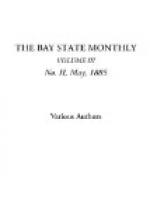We went home to tea with Julia Tappan, and Brother Weld was all anxiety to hear about the meeting. Julia undertook to give some account, and among other things mentioned that a warm-hearted abolitionist had found his way into the back part of the meeting, and was escorted out by Henry Ludlow. Weld’s noble countenance instantly lighted up, and he exclaimed: “How supremely ridiculous to think of a man’s being shouldered out of a meeting for fear he should hear a woman speak!"....
In the evening a colonizationist of this city came to introduce an abolitionist to Lewis Tappan. We women soon hedged in our expatriation brother, and held a long and interesting argument with him until near ten o’clock. He gave up so much that I could not see what he had to stand on when we left him.
After closing their meetings in New York the sisters held similar ones in New Jersey, all of which were attended only by women. From thence they went up the North River with Gerrit Smith, holding audiences at Hudson and Poughkeepsie. At the latter place they spoke to an assembly of colored people of both sexes, and this was the first time Angelina ever addressed a mixed audience.
The woman’s rights agitation, while entirely separate from abolitionism, owes its origin to the interest this subject excited in the hearts and minds of American women; and to Sarah and Angelina Grimke must be accorded the credit of first making the woman question one of reform. They wrote and spoke often on the theme. Public feeling grew strong against them, and at last the Congregational ministers of Massachusetts saw proper to pass a resolution of censure against the sisters! This resolution was issued as a “Pastoral Letter,” which, in the light and freedom of the present day, must be regarded as a most extraordinary document.
Whittier’s muse found the “Pastoral Letter” a fitting theme for its vigorous, sympathetic utterances. The poem thus inspired is perhaps one of the very best among his many songs of freedom. It will be remembered as beginning thus:—
“So this is all! the utmost reach
Of priestly power the mind
to fetter,
When laymen think, when women preach,
A war of words, a ‘Pastoral
Letter!’”
Up to this time nothing had been said by either of the sisters in their lectures concerning their views about women. They had carefully confined themselves to the subject of slavery, and the attendant topics of immediate emancipation, abstinence from the use of slave products, the errors of the Colonization Society, and the sin of prejudice on the account of color. But now that they had found their own rights invaded, they began to feel it was time to look out for the rights of their whole sex.
In the face of all this censure and ridicule the two sisters continued in the discharge of a duty to which they increasingly felt they were called from on high.




